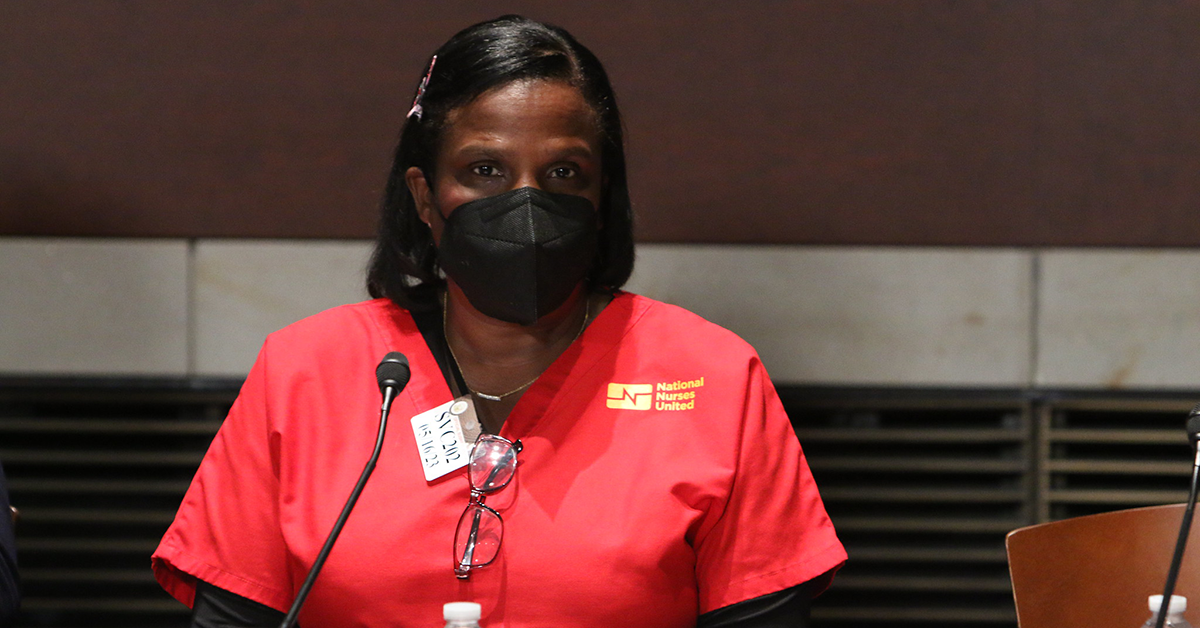Press Release
NNU and NYSNA President Nancy Hagans, RN, testifies in support of federal ratios legislation at Senate field hearing

National Nurses United (NNU) and New York State Nurses Association (NYSNA) President Nancy Hagans, RN, testified today at a Senate Health, Education, Labor and Pensions Committee hearing in support of federal legislation supporting mandatory minimum nurse to patient ratios. The hearing, titled “Overworked and Undervalued: Is the Severe Hospital Staffing Crisis Endangering the Well-Being of Patients and Nurses?” featured President Hagans and nurses from Robert Wood Johnson hospital who are members of United Steelworkers (USW) Local 4-200 currently on strike.
At the hearing in New Brunswick, N.J., President Hagans highlighted the fact that, except for the state of California, no current law sets limits that apply hospital wide to how many patients a nurse can be responsible for at one time.
“The nursing workforce is in crisis,” President Hagans said. “Years of industry neglect at the hands of our hospital employers, exacerbated by unsafe conditions during the ongoing pandemic, have left registered nurses feeling abandoned, morally distressed, and physically and emotionally exhausted.”
Hagans’ testimony focused on illustrating the impacts of understaffing on nurses and on patients and the role that hospital management plays in perpetuating this crisis. Across the country, nurses have been taking collective action through their union -- both at the bargaining table and through legislative advocacy -- to improve staffing levels in their hospitals, including in New York City where nearly 7,000 New York nurses with the New York State Nurses Association went on strike this past January.
Registered nurses should not have to go on strike for the scientifically proven, common-sense solution to our staffing crisis. Congress must take action to establish mandatory minimum nurse to patient staffing ratios at hospitals across the country. NNU has led the charge, urging Congress to swiftly pass S.1113, the Nurse Staffing Standards for Hospital Patient Safety and Quality Care Act of 2023 sponsored by Sen. Sherrod Brown. The bill would establish mandatory minimum staffing ratios based on the successful ratios that have been implemented in California. It would require hospitals to develop annual safe staffing plans that meet the bill’s minimum staffing ratios, and it would require hospitals to provide additional staffing based on individual patient care needs.
“Here in the Tri-State area, we do not have a shortage of nurses,” Hagans stated. “We have a staffing crisis in our hospitals brought on by the lack of good nursing jobs where RNs are valued for their work, have strong health and safety protections, and are not required to care for more patients at any given time than is safe for optimal, therapeutic care.”
According to statistics from the National Council of State Boards of Nursing and the U.S. Bureau of Labor Statistics, there were approximately 1.2 million licensed registered nurses nationally who were not employed as RNs in 2022. In New Jersey, there are over 56,000 actively-licensed registered nurses who were not employed as RNs in 2022. In New York, more than 175,000 actively-licensed registered nurses are not currently working.
In a 2022 NNU survey, more than half of nurses (55.5 percent) surveyed reported that they have considered leaving nursing.
National Nurses United is the largest and fastest-growing union and professional association of registered nurses in the United States with nearly 225,000 members nationwide. NNU affiliates include California Nurses Association, DC Nurses Association, Michigan Nurses Association, Minnesota Nurses Association, National Nurses Organizing Committee, and New York State Nurses Association.